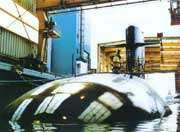 |
|||||
Main>Articles>Military Stuff>Scorpene SSK
Scorpene SSK
 In
early 2002, the Ministry of Defense signed a contract with DCN of France
to provide 2 new Scorpene-class submarines as well as 1 single ex-French
Navy Agosta 70 submarine. In return, France will allow Malaysia Airlines
to conduct more flights to France. Construction is also underway for a
Royal Malaysian Navy submarine base in Teluk Sepanggar, Sabah. This submarine
base is rumored to be highly advanced (submarines will not be visible
from air when docked) and will protect the submarines from sea and air
attack.
In
early 2002, the Ministry of Defense signed a contract with DCN of France
to provide 2 new Scorpene-class submarines as well as 1 single ex-French
Navy Agosta 70 submarine. In return, France will allow Malaysia Airlines
to conduct more flights to France. Construction is also underway for a
Royal Malaysian Navy submarine base in Teluk Sepanggar, Sabah. This submarine
base is rumored to be highly advanced (submarines will not be visible
from air when docked) and will protect the submarines from sea and air
attack.
The Scorpene SSK is one of the most advanced diesel submarines available
today. In terms of performance, its hull, constructed of high yield stress-specific
steel will allow it to dive up to 300m, deeper than most diesel subs and
as many times as needed. It will be able to achieve an average of 240
days at sea each year. A lot of effort has been made to reduce the Scorpene's
sound signature. Almost all equipment are mounted on elastic mountings
to avoid vibration noise from being radiated into the surrounding water.
Noisier equipment even have double-elastic mountings. This measures will
allow the Scorpene to avoid detection by hostile vessels while operating.
 With
the use of automated machinery, the crew complement was kept to a minimum
of 31 men with a standard watch team of nine. This is almost half the
crew of other submarines. In addition to that, the submarine can accomodate
a number of special operations crew. The life support systems of the submarine
can ensure the survival of the crew for seven days during emergencies.
Apart from that, there is a connection point for diving bells or rescue
vehicles.
With
the use of automated machinery, the crew complement was kept to a minimum
of 31 men with a standard watch team of nine. This is almost half the
crew of other submarines. In addition to that, the submarine can accomodate
a number of special operations crew. The life support systems of the submarine
can ensure the survival of the crew for seven days during emergencies.
Apart from that, there is a connection point for diving bells or rescue
vehicles.
The Scorpene has two diesel generation sets providing 1,250kW of power.
At the top of the hull immediately above the diesel generator sets is
a Dutch Breach machinery shipping hatch. The submarine has an elastically
supported 2,900kW electronic engine. It is also highly probable that the
RMN Scorpenes will be equipped with the MESMA AIP (Air Independent Propulsion)
system that will enable it to stay submerged for protracted periods, thus
reducing chances of detection by hostile forces. The MESMA system burns
liquid oxygen and ethanol to power its turbines.
The Scorpene will incorporate a variety of sonar
systems including a long-range passive cylindrical array, an intercept
sonar, active sonar, distributed array, flank array, a high-resolution
sonar for mine and obstacle avoidance and a passive towed array. All these
will work together to allow the submarine to detect enemy vessels, especially
submarines at great distances. A SUBTICS combat management system will
integrate all the offensive and defensive equipment of the submarine with
its sensors to allow the crew to operate the submarine effectively.
It has six 21inch torpedo tubes mounted on the bow that can launch a variety
of torpedoes. A total of 18 torpedoes and missiles or 30 mines can be
stored. The SM39 Exocet anti-ship missile with a range of over 50km can
be launched from the torpedo tubes. Once expelled from the tube, it will
travel to the surface inside a container. Upon reaching the surface, the
container will right itself and the Exocet missile will be launched. This
allows the Scorpene to engage hostile vessels from outside their defensive
perimeter, thus avoiding the risk of being attacked.